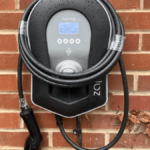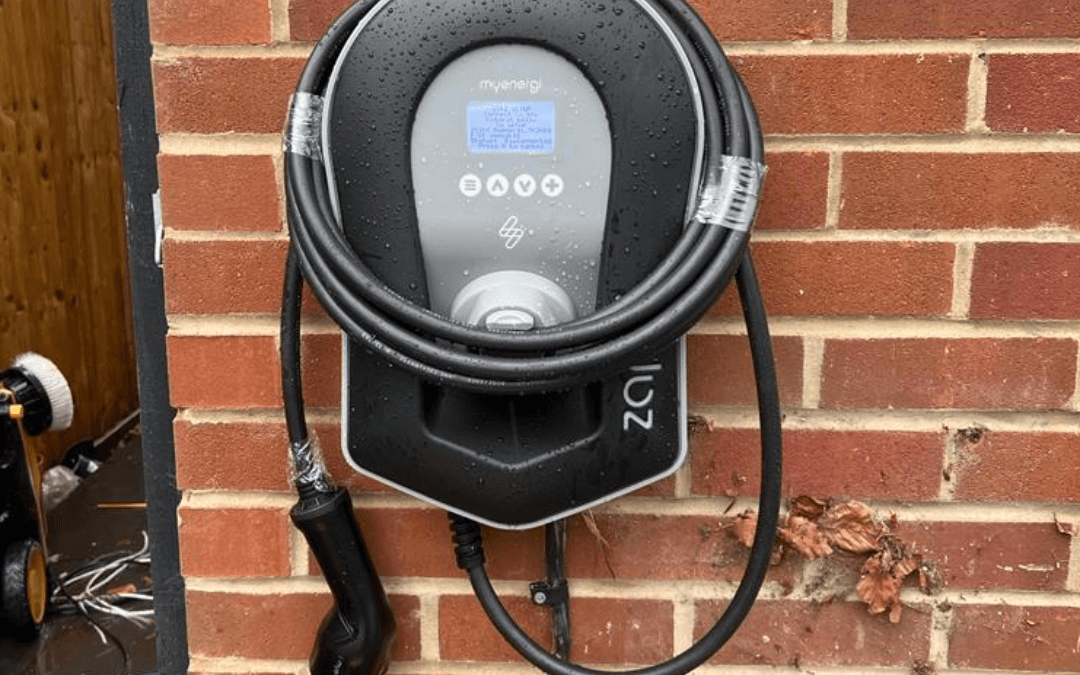If you own an electric vehicle (EV) or are planning to buy one in the near future, you might be wondering how to charge it at home. Charging your EV at home is not only convenient, but also cheaper and greener than using public charging points. However, there are many factors to consider when choosing the best EV charger for your home, such as the type, speed, size, design, and features of the EV charger. In this blog post, I will explain everything you need to know to help you choose the best home EV charger for your property and electric vehicle.
Types of home EV chargers
There are two main types of home EV chargers: tethered and untethered (or socketed).
A tethered charger has a fixed cable attached to it, which plugs directly into your car’s charging port. A tethered charger is convenient because you don’t have to carry a separate cable with you, but it may not be compatible with all types of EVs.
An untethered charger has a socket that allows you to use your own cable, which can be either Type 1 or Type 2 depending on your car’s charging port. An untethered charger is more versatile because it can charge any type of EV, but it requires you to store and handle a cable.
Another way to classify home EV chargers is by their charging speed, which is measured in kilowatts (kW). The higher the kW, the faster the charger can fill up your car’s battery. Most home EV chargers have a charging speed of either 3 kW or 7 kW, which can add about 15 miles or 30 miles of range per hour of charging respectively. Some home EV chargers can deliver up to 22 kW of charging speed, which can add about 80 miles of range per hour of charging, but they require a three-phase electricity supply, which is not common in UK homes. Moreover, not all EVs can accept such high power from a home charger, so you will need to check your electric car’s specifications before choosing a high-speed charger for your home.
Size and design of home EV chargers
Home EV chargers come in different sizes and designs, depending on the brand and model. Some chargers are compact and discreet, while others are larger and more noticeable. Some chargers have a sleek and modern design, while others are more functional and plain. Some chargers have a built-in display screen that shows information such as charging status, battery level, and energy consumption, while others rely on a smartphone app or LED indicators for communication. The size and design of your home EV charger may depend on your personal preference, as well as the available space and aesthetics of your property.
Features of home EV chargers
Home EV chargers may also offer different features that enhance their functionality and convenience. Some of these features are:
- Smart charging: This feature allows your charger to automatically adjust the timing and rate of charging based on various factors, such as electricity tariffs, National Grid demand, renewable energy availability, and your driving schedule. Smart charging can help you save money and reduce your carbon footprint by optimising your energy usage.
- Wi-Fi or Bluetooth connectivity: This feature enables your charger to connect to the internet or your smartphone via Wi-Fi or Bluetooth connectivity. This allows you to remotely monitor and control your charging sessions, as well as access data and statistics on your energy consumption and costs.
- Solar panel integration: This feature allows your EV charger to work with your solar panels (if you have any) to use the excess solar energy generated by your panels to charge your electric car. This can further reduce your electricity bills and environmental impact by using clean and free energy to charge your EV.
- Public network integration: This feature allows your EV charger to link with a public network of charging points across the UK. This gives you access to thousands of public chargers that you can use when you are away from home. Some networks may also offer discounts or rewards for using their chargers.
Examples of home EV chargers
To give you an idea of what kind of home EV chargers are available in the UK market, here are some examples of popular models:
- Pod Point Solo 3: This is a smart and simple untethered charger that offers 3 kW or 7 kW of charging speed. It has Wi-Fi connectivity and a smartphone app that lets you monitor and schedule your charging sessions. It also integrates with the Pod Point public network, giving you access to over 3,000 public chargers across the UK.
- Andersen A2: This is a stylish and sophisticated tethered charger that offers 7 kW or 22 kW of charging speed. It has a sleek aluminium casing that hides the cable when not in use. It has Wi-Fi connectivity and a smartphone app that lets you track and manage your energy usage. It also supports solar panel integration.
- EO Mini Pro (v2): This is a compact and unobtrusive untethered charger that offers 7 kW of charging speed. It is one of the smallest chargers on the market, measuring only 175 x 125 x 125 mm. It has Wi-Fi and Bluetooth connectivity and a smartphone app that lets you control and monitor your charging sessions. It also supports smart charging.
- Ohme Home Pro: This is a smart and informative tethered charger that offers 7.4 kW of charging speed. It has a built-in LCD screen that shows information such as battery level and charging rate. It has Wi-Fi and Bluetooth connectivity and a smartphone app that lets you adjust and schedule your charging sessions. It also supports smart charging and solar panel integration.
- Myenergi Zappi 2.0: This is a versatile and eco-friendly untethered charger that offers 3.6 kW or 7 kW of charging speed. It has a built-in display screen that shows information such as energy consumption and carbon savings. It has Wi-Fi connectivity and a smartphone app that lets you access and customise your charging settings. It also supports smart charging and solar panel integration. This is the EV Charger that NXTGEN Energy recommends.
Conclusion
Choosing the best home EV charger for your home depends on several factors, such as the type, speed, size, design, and features of the charger, as well as the compatibility, specifications, and preferences of your car and property. By comparing different models and brands of home EV chargers, you can find the one that suits your needs and budget. A home EV charger can make your life easier, cheaper, and greener by allowing you to charge your car at home in a fast and convenient way.
As you can see from above, Zappi is more than just an EV Electric Vehicle Charger. It is a smart, green, and cost-effective solution that allows you to charge your EV with surplus energy from your solar panels or wind turbine. It also has many other features that make it easy, convenient, and safe to use.
If you are interested in installing a Zappi EV Charger at your home or business, contact us today on 01268 928 690 or via the ‘Enquire Now’ button below. We are an authorised installer of myenergi products and we can help you with every step of the process, from a free no-obligation consultation to installation to aftercare.
Frequently Asked Questions about EV Chargers
An EV charger is a device that supplies electric power to an electric vehicle (EV) to recharge its battery. EV chargers can be installed at home, at work, or in public places.
To charge your EV at home, you need to have a home EV charger installed by a qualified electrician. A home EV charger can be either tethered or untethered, depending on whether it has a fixed cable or a socket. You also need to have a suitable electricity supply and a dedicated circuit for your charger. You can plug your car into your home charger using the appropriate cable and start charging.
The time it takes to charge your EV at home depends on the charging speed of your home charger and the battery capacity of your car. Most home EV chargers have a charging speed of either 3 kW or 7 kW, which can add about 15 miles or 30 miles of range per hour of charging respectively. Some home EV chargers can deliver up to 22 kW of charging speed, which can add about 80 miles of range per hour of charging, but they require a three-phase electricity supply and a compatible car. The battery capacity of your car determines how much energy it can store and how far it can travel on a single charge. The larger the battery, the longer it takes to charge.
The cost of charging your EV at home depends on the electricity tariff you pay and the amount of energy you use. The electricity tariff is the price you pay per unit of electricity (kWh) and it may vary depending on the time of day, the supplier, and the type of contract. The amount of energy you use depends on the battery size of your car and the state of charge. The higher the battery size and the lower the state of charge, the more energy you need to charge. To calculate the cost of charging your EV at home, you can multiply the electricity tariff by the amount of energy you use.
Charging your EV at home has many benefits, such as: Convenience: You can charge your car whenever you want and avoid waiting in queues or searching for available public chargers. Savings: You can save money by using cheaper electricity tariffs at home and avoiding fees or subscriptions for public chargers. Greenness: You can reduce your carbon footprint by using renewable energy sources at home, such as solar panels or wind turbines.
Some features that can enhance the functionality and convenience of your home EV charger are: Smart charging: This feature allows your charger to automatically adjust the timing and rate of charging based on various factors, such as electricity tariffs, grid demand, renewable energy availability, and your driving schedule. Wi-Fi or Bluetooth connectivity: This feature enables your charger to connect to the internet or your smartphone via Wi-Fi or Bluetooth. This allows you to remotely monitor and control your charging sessions, as well as access data and statistics on your energy consumption and costs. Solar integration: This feature allows your charger to work with your solar panels (if you have any) to use the excess solar energy generated by your panels to charge your car. Public network integration: This feature allows your charger to link with a public network of charging points across the UK. This gives you access to thousands of public chargers that you can use when you are away from home. Some networks may also offer discounts or rewards for using their chargers.
Latest EV Electric Vehicle Charger Posts
- OZEV Grant 2023 – The EV Charger Grant
 Are you thinking of buying an electric vehicle (EV) or a plug-in hybrid vehicle (PHEV) and wondering how to charge it at home? If so, you might be interested in the OZEV grant, a government scheme that can help you save money on installing a home charging point. In this blog post, we will explain… Read more: OZEV Grant 2023 – The EV Charger Grant
Are you thinking of buying an electric vehicle (EV) or a plug-in hybrid vehicle (PHEV) and wondering how to charge it at home? If so, you might be interested in the OZEV grant, a government scheme that can help you save money on installing a home charging point. In this blog post, we will explain… Read more: OZEV Grant 2023 – The EV Charger Grant - How To Choose The Best EV Charger For Your Home
 If you own an electric vehicle (EV) or are planning to buy one in the near future, you might be wondering how to charge it at home. Charging your EV at home is not only convenient, but also cheaper and greener than using public charging points. However, there are many factors to consider when choosing… Read more: How To Choose The Best EV Charger For Your Home
If you own an electric vehicle (EV) or are planning to buy one in the near future, you might be wondering how to charge it at home. Charging your EV at home is not only convenient, but also cheaper and greener than using public charging points. However, there are many factors to consider when choosing… Read more: How To Choose The Best EV Charger For Your Home - Why You Should Choose Zappi Electric Vehicle Chargers for Your Home or Business
 Electric vehicles (EVs) are becoming more popular than ever, thanks to their many benefits for the environment, the economy, and the drivers. EVs use less or no fuel, which saves money and reduces emissions. They also have lower running and maintenance costs than petrol or diesel vehicles. Some EVs can use renewable electricity sources, which… Read more: Why You Should Choose Zappi Electric Vehicle Chargers for Your Home or Business
Electric vehicles (EVs) are becoming more popular than ever, thanks to their many benefits for the environment, the economy, and the drivers. EVs use less or no fuel, which saves money and reduces emissions. They also have lower running and maintenance costs than petrol or diesel vehicles. Some EVs can use renewable electricity sources, which… Read more: Why You Should Choose Zappi Electric Vehicle Chargers for Your Home or Business - How long do electric vehicles take to charge?
 Charging time is one of the main challenges for electric vehicle (EV) buyers, along with driving range. The truth is, it takes longer to charge an electric vehicle than to fill up a conventional car with fuel. But there are ways to make charging easier and more convenient. Here are some tips to help you… Read more: How long do electric vehicles take to charge?
Charging time is one of the main challenges for electric vehicle (EV) buyers, along with driving range. The truth is, it takes longer to charge an electric vehicle than to fill up a conventional car with fuel. But there are ways to make charging easier and more convenient. Here are some tips to help you… Read more: How long do electric vehicles take to charge? - How to Monitor and Control Your Energy Usage with the myenergi App
 If you are looking for a smart and easy way to track and manage your solar energy consumption, generation and storage, you might want to check out the myenergi app. This clever little app lets you remotely monitor and control your set of myenergi devices, such as the Zappi EV Electric Vehicle Chargers, the Eddi… Read more: How to Monitor and Control Your Energy Usage with the myenergi App
If you are looking for a smart and easy way to track and manage your solar energy consumption, generation and storage, you might want to check out the myenergi app. This clever little app lets you remotely monitor and control your set of myenergi devices, such as the Zappi EV Electric Vehicle Chargers, the Eddi… Read more: How to Monitor and Control Your Energy Usage with the myenergi App

